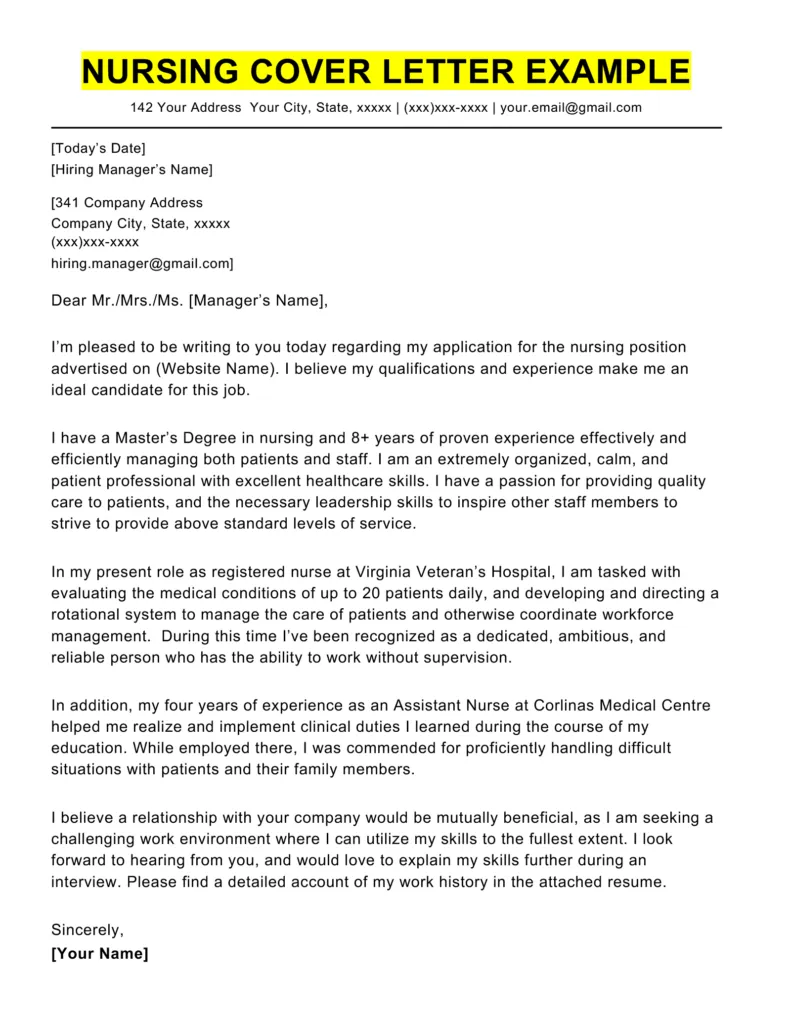Crafting a Winning Nursing Cover Letter
A well-crafted nursing cover letter is your first impression, your opportunity to showcase your skills, experience, and passion for the nursing profession. It’s a crucial document that complements your resume and provides a more detailed narrative of your qualifications. Unlike a resume that presents facts, a cover letter allows you to express your personality, explain why you’re the ideal candidate, and connect with the hiring manager on a personal level. By presenting a compelling cover letter, you significantly increase your chances of securing an interview and ultimately, landing your dream nursing job. Remember, this isn’t just about listing your past roles; it’s about telling a story of your career aspirations and what you can offer to the healthcare facility.
Understanding the Purpose of a Nursing Cover Letter
The primary goal of a nursing cover letter is to persuade the hiring manager that you are the right fit for the position. It allows you to elaborate on your resume, highlighting key skills and experiences that align with the job requirements. This is also an opportunity to express your enthusiasm for the role and the healthcare organization. The cover letter should demonstrate your understanding of the facility’s values and how your skills and experience can contribute to their mission. A well-written cover letter isn’t just a formality; it’s a strategic tool that helps you stand out from the crowd of other qualified applicants and makes a lasting impression on the recruiter. It offers a chance to showcase your personality and make a connection with the hiring manager.
Highlighting Your Skills and Experience
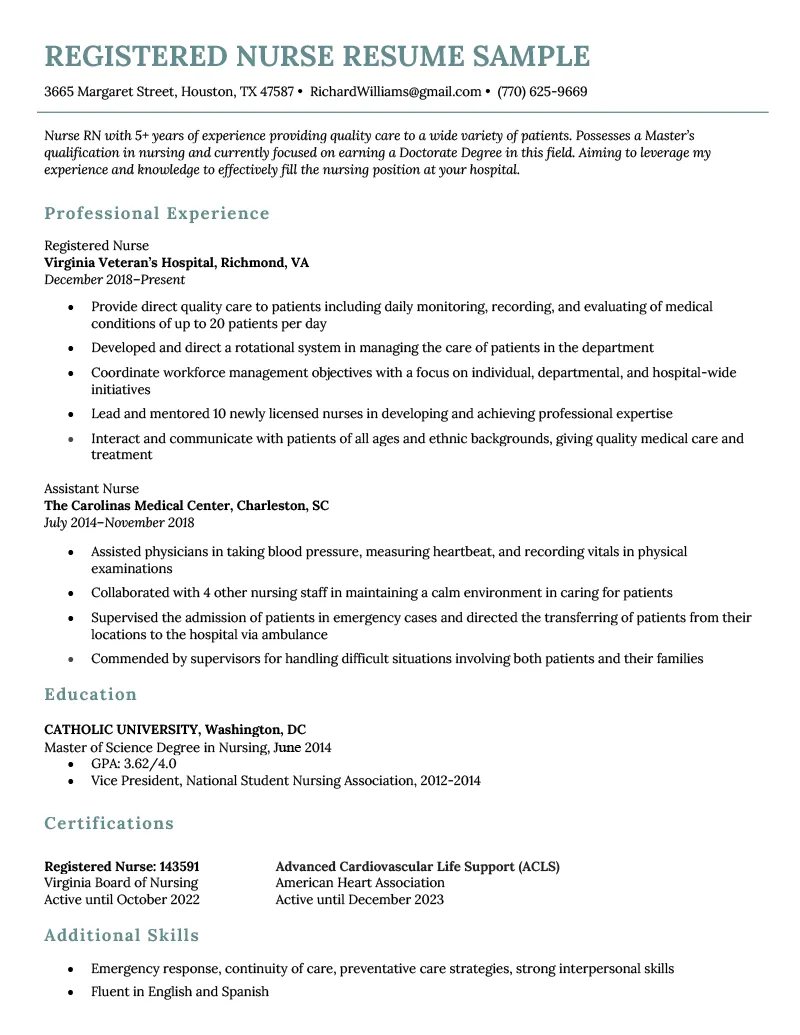
Your nursing cover letter should focus on showcasing your relevant skills and experiences, aligning them with the specific requirements outlined in the job description. This means carefully reviewing the job posting and identifying the key qualifications the employer is seeking. Consider the clinical expertise, technical proficiency, and soft skills that are essential for the role. Provide specific examples to illustrate how you have successfully applied these skills in previous nursing roles. Instead of just listing your duties, explain how you utilized your skills to achieve positive outcomes, improve patient care, or contribute to a team. Use action verbs to describe your accomplishments and quantify your achievements whenever possible to make your qualifications even more impactful and measurable.
Key Elements to Include in Your Nursing Cover Letter
A comprehensive nursing cover letter should include several essential elements to make a strong impact. Start with your contact information at the top, including your name, phone number, email address, and LinkedIn profile if applicable. Always address the hiring manager by name, if possible. If you don’t know the hiring manager, use a general salutation such as “Dear Hiring Manager.” In the opening paragraph, state the position you are applying for and how you learned about the opportunity. Briefly mention your most relevant qualifications and express your interest in the role. The body of your letter should provide detailed examples, using specific experiences to showcase your skills and achievements. Conclude with a strong closing paragraph, reiterating your interest, expressing gratitude for the opportunity, and indicating your availability for an interview. A clear and concise letter will catch the hiring manager’s attention.
Contact Information and Professional Summary
Begin your cover letter by providing your contact information, including your name, phone number, email address, and professional social media profile link if you have one. Following this, write a brief, compelling professional summary that highlights your key qualifications and nursing career goals. This is the first impression a hiring manager will have, so make it impactful and attention-grabbing. The summary should succinctly capture your most relevant skills, experience, and areas of expertise. Tailor this section to each specific job application, emphasizing the skills and experiences that best align with the position requirements. This is a great place to demonstrate your enthusiasm and passion for nursing, setting the tone for the rest of your cover letter.
Showcasing Your Nursing Skills
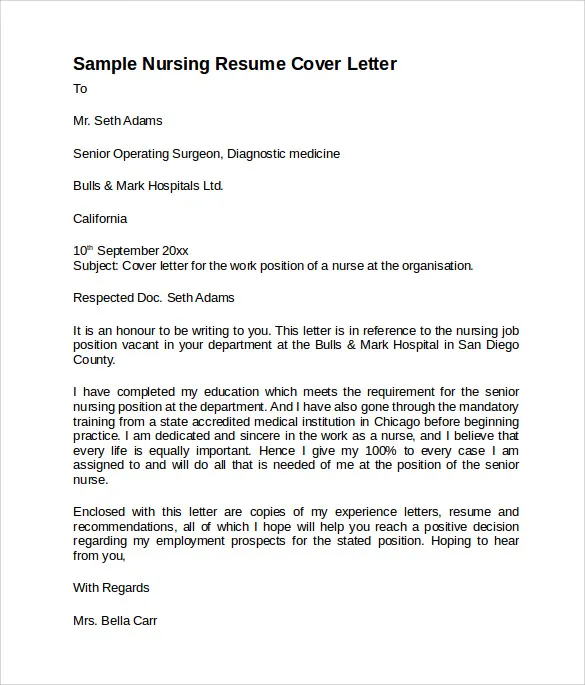
When showcasing your skills, focus on those that are most relevant to the job requirements. Nursing roles demand a broad range of skills, including clinical expertise, technical proficiency, communication, and critical thinking. Provide specific examples that demonstrate your proficiency in these areas. Detail how you have used these skills to improve patient outcomes, collaborate with healthcare teams, or manage challenging situations. Use action verbs to describe your accomplishments, such as “administered medications,” “managed patient care,” or “collaborated with multidisciplinary teams.” Also, include examples of your soft skills, like compassion, empathy, and leadership, which are essential for providing quality patient care and working well within a healthcare environment. Make sure your skill set matches the keywords in the job description.
Quantifying Your Achievements
Whenever possible, quantify your achievements to demonstrate your impact and value. Providing numbers and statistics gives concrete evidence of your successes and adds credibility to your claims. Instead of simply stating “improved patient care,” provide data, such as “reduced patient falls by 15%.” Other examples include the number of patients you have cared for, the successful completion of certain medical procedures, or improvements in patient satisfaction scores. Quantifying achievements makes your accomplishments more tangible and shows the hiring manager the positive results you have achieved in previous roles. This level of detail helps your cover letter stand out and reinforces your qualifications.
Demonstrating Your Passion for Nursing
Your cover letter is an excellent opportunity to show your passion for nursing. Express your enthusiasm for providing patient care and your commitment to making a positive impact on patients’ lives. Share what initially drew you to the nursing profession and what motivates you to excel in this field. Highlight any volunteer work, specialized training, or professional development activities you’ve undertaken. This demonstrates your dedication to continuous learning and growth. Be genuine in your expression of passion, as this will resonate with the hiring manager and help you connect on a personal level. Mentioning your professional goals can also show your commitment to the future of nursing and your desire to contribute to the healthcare team.
Tailoring Your Cover Letter to the Job
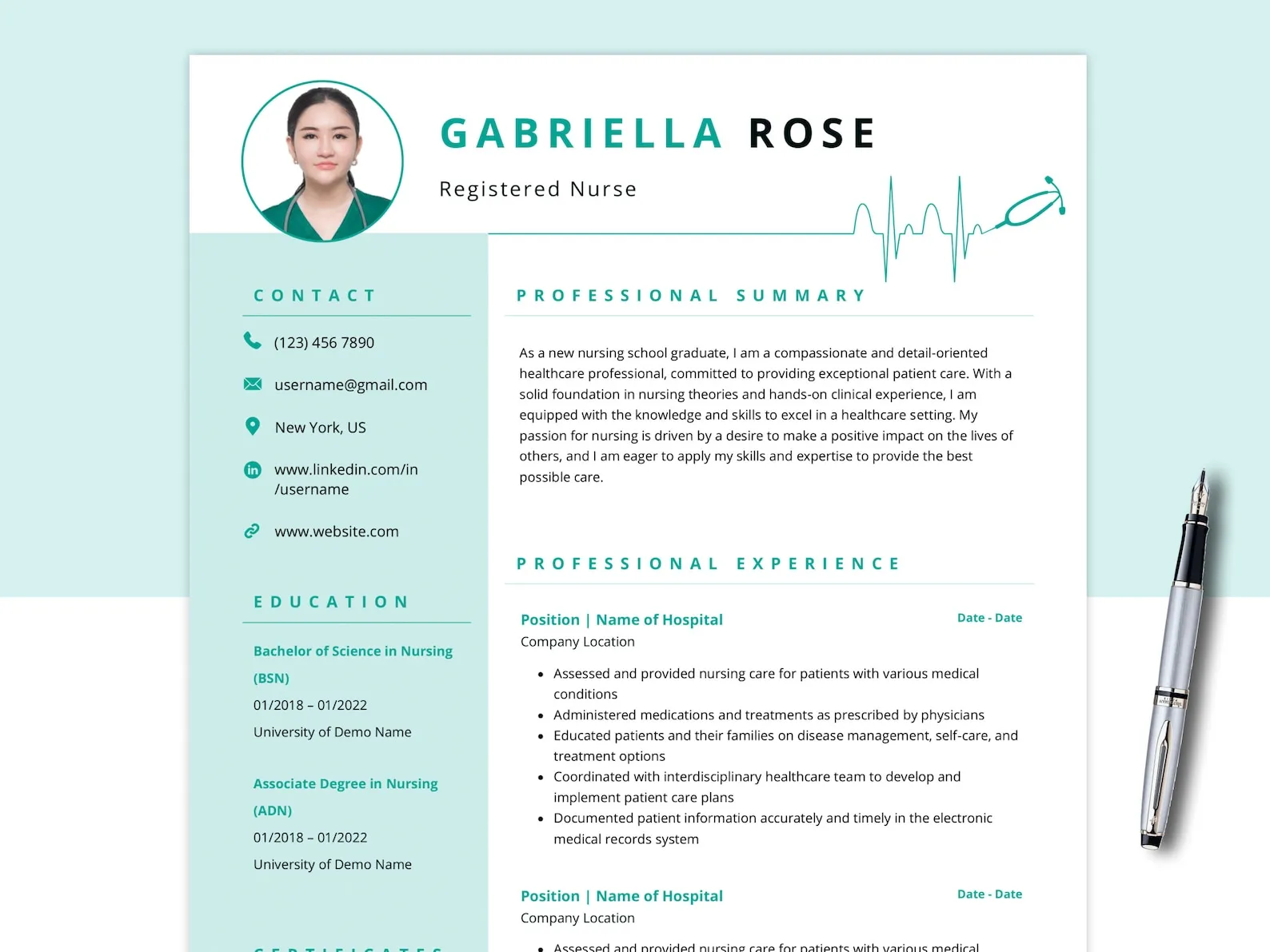
Customizing your cover letter for each specific job application is essential. A generic cover letter will not have the same impact as one tailored to the specific requirements and culture of the healthcare facility. Review the job description carefully and identify the key skills, experience, and qualifications the employer is seeking. Then, align your cover letter with these specific requirements, emphasizing the relevant aspects of your background. Research the healthcare facility to understand its mission, values, and patient care approach. Personalize your cover letter by mentioning your interest in the facility’s specific programs or initiatives. Tailoring your letter shows that you have a genuine interest in the opportunity and that you have taken the time to understand the employer’s needs.
Researching the Healthcare Facility
Before writing your cover letter, dedicate time to research the healthcare facility. Understand their mission, values, and patient care approach. Explore their website, social media profiles, and any news articles or publications related to the organization. This research will provide valuable insights into the facility’s culture, priorities, and any specific initiatives they may be undertaking. Mention any of their recent achievements or programs that appeal to you. This shows your genuine interest and allows you to tailor your letter accordingly. Demonstrate your understanding of the facility’s values and explain how your skills and experience align with their goals and mission. This customization will make your cover letter stand out and show that you are serious about the opportunity.
Using Keywords from the Job Description
To ensure your cover letter gets noticed, incorporate keywords from the job description. These keywords are often used by applicant tracking systems (ATS) to screen applications. Carefully review the job description and identify the key skills, qualifications, and responsibilities mentioned. Weave these keywords naturally into your cover letter, emphasizing how your experience aligns with the requirements. However, avoid keyword stuffing. Your cover letter should read naturally and showcase your personality. Incorporating relevant keywords increases the likelihood that your application will pass through the ATS and be seen by a human reader. This will improve your chances of getting noticed by the hiring manager.
Different Nursing Cover Letter Examples
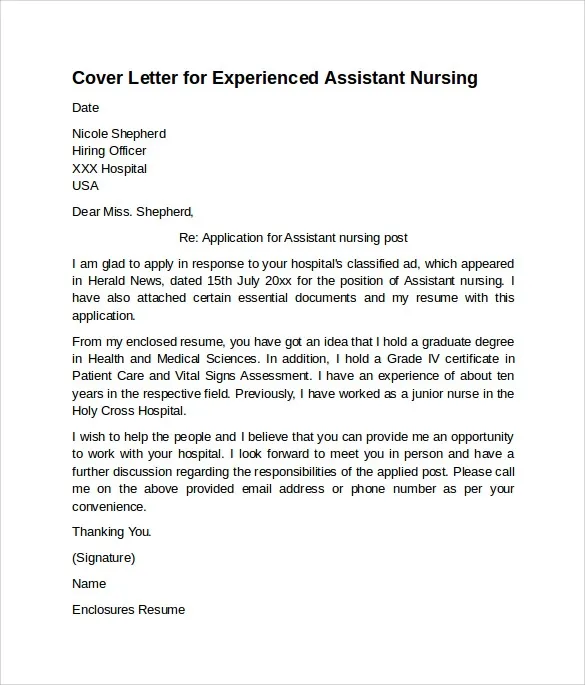
There are a few types of nursing cover letters that are suitable for different levels of experience and various roles. Understanding the core differences helps in creating a letter that best represents your qualifications and career goals.
Entry-Level Nurse Cover Letter Example
For entry-level nurses, the cover letter should highlight educational background, clinical experiences gained during rotations, and any volunteer work. Emphasize any skills that you gained during your nursing program or any additional training you have had. Demonstrate your passion for nursing and willingness to learn. If you have any relevant certifications or licenses, be sure to include them. Even if you lack extensive experience, you can focus on your enthusiasm, transferable skills, and academic achievements to create a strong first impression. Include specific examples of your clinical experience and how you applied your knowledge.
Experienced Nurse Cover Letter Example
Experienced nurses should focus on showcasing their years of experience and the results they have achieved. Highlight specific accomplishments, such as improvements in patient outcomes, successful implementation of new protocols, or leadership roles. Quantify your achievements whenever possible. Mention any specialized skills or certifications, such as critical care, emergency nursing, or informatics. This demonstrates your expertise in these specific areas. Also, mention any professional development activities and leadership positions you have held, showing your commitment to the field. Tailor your cover letter to highlight experiences most relevant to the job. This emphasizes your ability to lead the team.
Nurse Practitioner Cover Letter Example
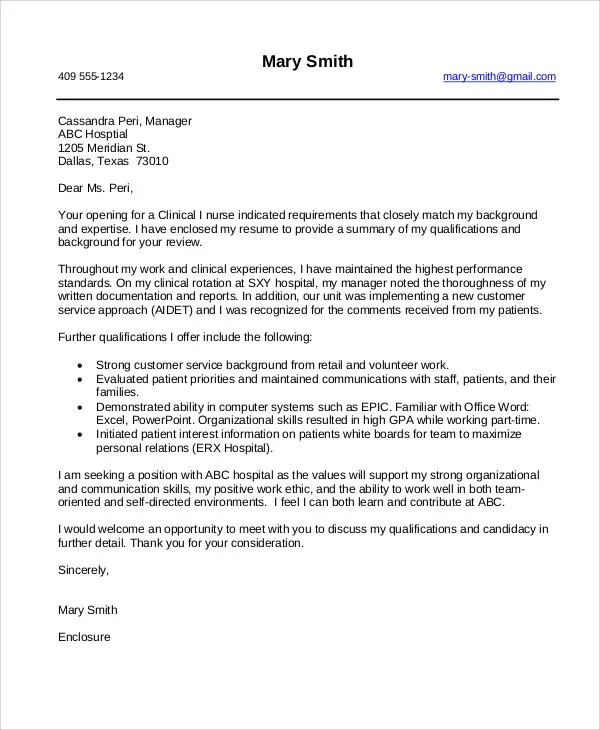
Nurse practitioners (NPs) have advanced nursing training and responsibilities. The cover letter should highlight their clinical expertise, patient management skills, and any specialized certifications. Emphasize experiences such as prescribing medications, diagnosing illnesses, and collaborating with other healthcare providers. Quantify your achievements by detailing how you have improved patient outcomes or contributed to clinic efficiency. Demonstrate your ability to work independently and make critical decisions. It is important to mention any relevant certifications or licenses. Showcase your leadership skills and passion for providing comprehensive patient care. Tailor the letter to the specific role, mentioning any relevant experience or expertise.
Tips for Writing a Memorable Nursing Cover Letter
To create a memorable nursing cover letter, there are several tips that can help you stand out. These are not always about writing a great cover letter but also about presenting it in a professional manner. Attention to detail and tailoring to the specific job posting are essential.
Proofreading and Editing Your Cover Letter
Proofreading and editing your cover letter is a crucial step to ensure your letter is polished and error-free. Errors in grammar, spelling, and punctuation can create a negative impression and undermine your credibility. Always proofread your letter multiple times, and consider asking a colleague or friend to review it as well. Use grammar checkers and spell-checking tools, but don’t rely on them entirely. Read your cover letter out loud to catch any awkward phrasing or sentences that don’t flow smoothly. Make sure the tone of your letter is professional and that it aligns with your career goals. Proofreading is an important part of the application process.
Formatting for Readability
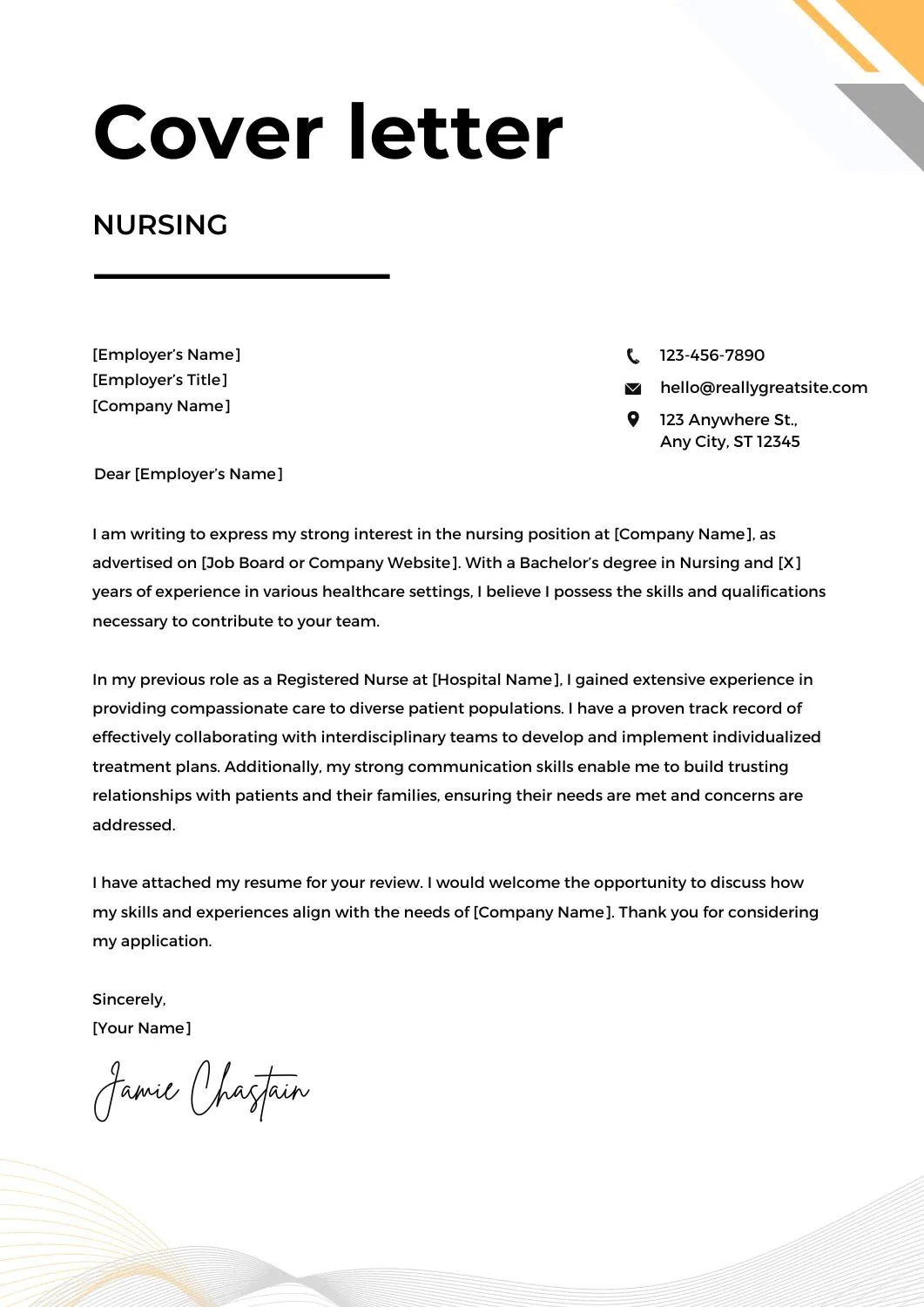
Proper formatting is essential for readability. Use a professional font such as Times New Roman, Arial, or Calibri, and ensure your font size is easy to read (e.g., 11 or 12 points). Use clear headings, bullet points, and plenty of white space to break up the text and make it easy for the hiring manager to scan. Keep paragraphs concise and focused, and avoid long blocks of text. Choose a clean and simple layout that complements your resume. Ensure your cover letter is formatted consistently with your resume and other application materials. Professional formatting ensures that your cover letter is visually appealing, easy to navigate, and makes a positive impression.
Following Up After Submission
After submitting your cover letter and resume, it’s appropriate to follow up with the hiring manager or recruiter. This demonstrates your continued interest in the position and can help keep your application top of mind. Send a brief, professional email or make a phone call about a week after submitting your application, and politely inquire about the status of your application. Thank the hiring manager for their time and reiterate your interest in the position. Keep the communication concise and respectful, and ensure you’re available for any follow-up steps, such as an interview. A well-timed follow-up shows your proactiveness and enthusiasm, making a positive impression.
